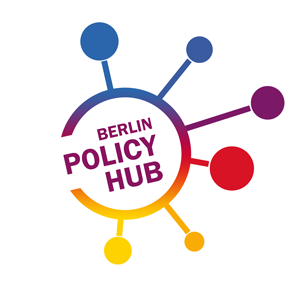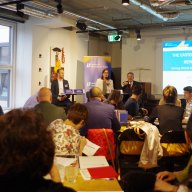Discussing the future of the Eastern Partnership with Think Tankers from Region

On 16 October 2019, IEP organized an event on “The Eastern Partnership beyond 2020: Joining efforts for a more effective policy” in the framework of the Berlin Policy Hub. In an informal setting 50 representatives from think tanks, authorities, and media from both Germany and the region met to discuss the future of the Eastern Partnership (EaP).
After a warm welcome by IEP Director Katrin Böttger, the Special Representative for the Eastern Partnership of the Federal Foreign Office, Hans-Jürgen Heimsoeth, voiced his interest in the forthcoming discussions and ideas formulated by think tankers from the region.
The discussion on the future of the Eastern Partnership took place in four thematic working groups: 1) Design of the EaP, 2) Governance and Rule of Law, 3) Economic Development and 4) the Security Dimension of the EaP. After input from think tank representatives from the EaP countries on potential reforms and suggestions for improvement in the specific fields, each group engaged in a lively discussion on the feasibility and potential obstacles of the proposals made. Subsequently, the outcomes were presented by working group rapporteurs to the plenum and commented by Ambassador Heimsoeth.
The working group on the overall Design of the Eastern Partnership put forward the idea of eventually offering the EaP countries a complete integration into the European single market including the four freedoms and suggested to further institutionalize political consultations between EaP countries and the EU. The idea of a differentiation within the EaP was highly debated as it represents a tradeoff between a potential reward mechanism for countries that achieve progress in reforms and the risk of discouragement for other countries and their societies. The idea to differentiate institutionally between the EaP countries according to their progress, was also rejected by Ambassador Heimsoeth, in order not to split the EaP group.
The working group on Governance and Rule of Law identified two main issues that need to be addressed more effectively within the EaP framework: the slow process of decentralization and the lacking independence of the judiciary. Ambassador Heimsoeth agreed on the need for more decentralization, but called for more specific target definitions and more tangible proposals on how to achieve it. Also the need to increase capacities of government authorities and administrations was highlighted.
The group on Economic Development voiced its support for multilateral dialogue, which is necessary to assess cross-border issues and solve them together, particularly with regard to Russia, as the Russian factor still constitutes a massive investment barrier. Ambassador Heimsoeth additionally mentioned FDIs as a factor contributing to reducing unemployment and supporting economic development.
Suggestions for improvement presented by the working group on the Security Dimension of the EaP included among other things the integration of the EaP countries into the Common Foreign and Security Policy, rather than the current punctual cooperation in certain fields. According to Ambassador Heimsoeth’s assessment, there is potential for an intensification of bilateral cooperation.
Following the discussion, all participants were invited to an informal networking dinner, where the think tank representatives from Georgia, Moldova and Ukraine had the opportunity to present themselves at a “fair of opportunities” and further discuss the future of the EaP with their German interlocutors.
The Berlin Policy Hub is part of the “Europeanization beyond process” initiative supported by the Open Society Foundations and aims to intensify exchanges between Eastern European think tanks and their German counterparts and to facilitate new forms of cooperation. The project gives think tankers from Georgia, Moldova and Ukraine the opportunity to present their expertise and research results to a German audience, while at the same time gaining a better understanding of the discourse within Germany on these topics.























